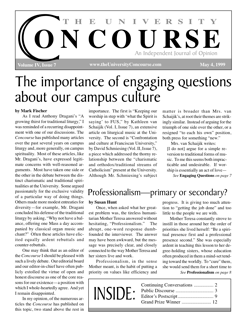Education not limited to the mind
by Susan C. Fischer
In the last issue of the Concourse my esteemed fellow editor, Ben Brown, charged me with confusing moral and intellectual formation because I said that education is directed toward the perfection of the whole man. However, I am very aware of the distinction between moral and intellectual formation, and yet I hold fast to my claims.
First, I don’t think I anywhere implied that liberal education alone may tame the passions or the will. Only grace can bring about such a transformation. On that point Ben and I and Newman fully agree. But I don’t think it touches the main point of my piece, which was as follows:
Someone with a liberally educated mind—able to view the Whole, developed in a fuller manner than the technical alone, able to see the rationale and ramifications of actions—will comport himself very differently in the professional realm than someone trained in only the technical. We have more confidence in a liberally-educated nurse than in one possessing a two year technical degree, not only because of her moral virtues, but because of her “view of the Whole.” For example, in an emergency she will have the ability to assess the situation, weed through thoughts quickly, and come up with a plan of action. If the family concerned is in crisis, she is more likely to know how to handle differing personalities, as she has experience of life from reading that could normally only be gained through multiple lifetimes. Because of her knowledge of the human person, the liberally educated nurse is typically caring, thoughtful and sensitive—something like the “gentleman” described by Newman as the product of a liberal education. Perhaps she is my “gentleman.” I do not know her religion; I cannot search her motives; all I know is that she is a proper nurse. I appreciate her refinement, professionalism, and human fullness, as they are displayed in the professional arena.
However, as a Catholic institution possessing the truth of Christ, FUS must take education one step farther. A Catholic institution doesn’t stop at forming the mind, but seeks to integrate the spiritual, moral and intellectual aspects of man. In her essay, “Problems of Women’s Education,” St. Edith Stein states: “We must therefore keep in mind the comprehensive idea of education…education as the orientation of the whole person towards the goal for which he is destined. This process embraces body, soul, and mind with all their faculties.” When one is educated at FUS, as noted in the mission statement of the University, he is hopefully educated in his entirety. The following quote by Pius X in his encyclical, Rappresentanti, on Christian education, reiterates much of the goals of FUS in education:
the authentic and immediate goal of Christian education… cooperation with God’s grace in the formation of the true and perfect Christian; that means in the formation of Christ Himself in the person reborn through baptism… The real Christian, the fruit of Christian upbringing, is consequently the supernatural person who thinks, judges, and acts always and consistently according to right reason enlightened by the supernatural light of Christ’s example and teachings; or, to say in today’s language, the true and perfect man of character.
When I speak of education, then, I have in mind more than just the formation of intellectual virtues; I am speaking of the education of the whole man. If the goal of FUS were limited to producing “gentlemen,” then it would suffice to form only the mind. But, our goals are loftier; we are interested in the perfection of the whole man.
I reiterate my conviction that these goals can only be met by an educational program that includes a liberal core for all majors, as well as the faith environment already in place at FUS. This was and remains the point of my earlier piece.
Susan C. Fischer, Class of ‘84


